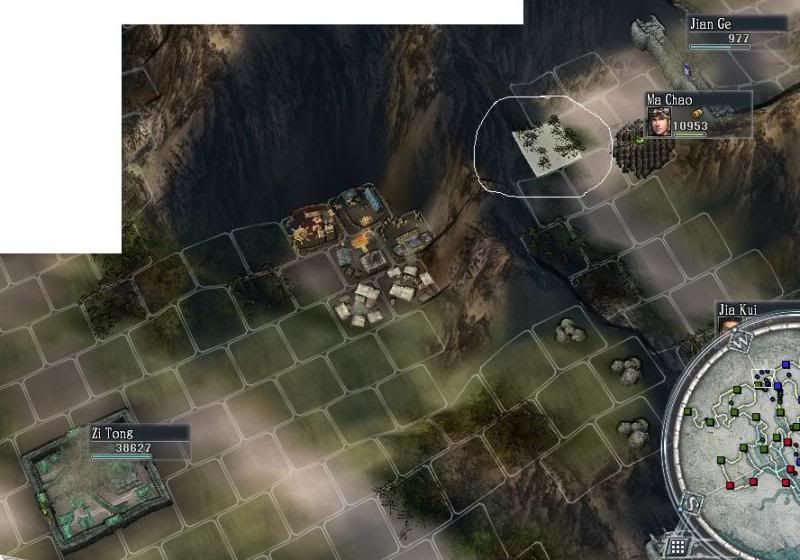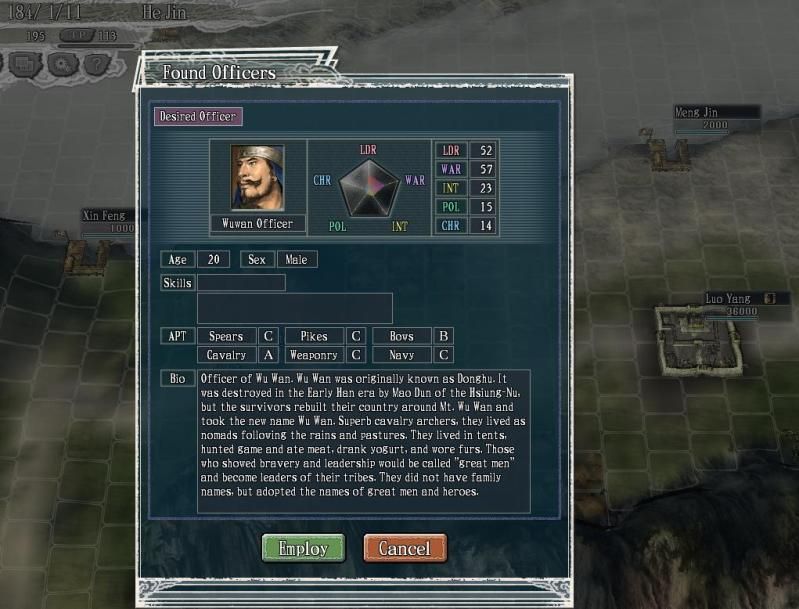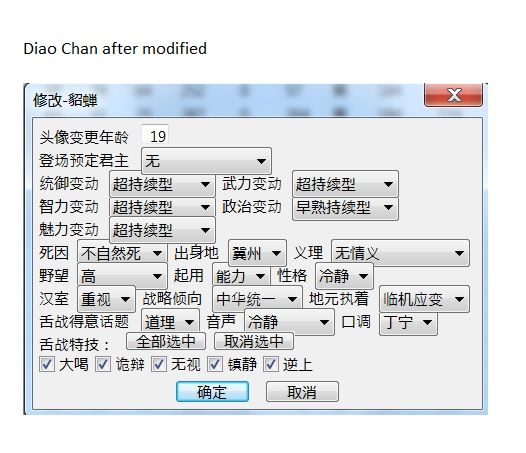Wuwan Chief
Chief officer of Wu Wan. Wu Wan used the Yellow Turban Rebellion to expand its power. Liao Xi's Qiu Liju, Shang Gu's Nan Lou, Liao Dong's Su Pu Yan and You Bei Ping's Wu Yan raised an army, and Qiu Liju's successor, Ta Dun became exceedingly powerful. In 189, You Zhou's Liu Yu appeased Wu Wan with his conciliation strategy, but he was defeated and killed by the hawkish Gongsun Zan. Yuan Shao wiped out Gongsun Zan and took control of Nei Bei. He also followed a conciliation policy, and after Yuan Shao's son Yuan Xi and Yuan Shang lost to Cao Cao, turned to Wu Wan for help. In 207, Wu Wan and the Yuan Brothers fought Cao Cao at Liu Cheng, but they were defeated. After that, Wu Wan's horses became the elite of Cao Cao's army and the scourge of Wu-Shu....
Wuwan Officer
Shanyue Chief
Chief officer of Shan Yue. At the end of the Late Han, Shan Yue was a vehement opponent of the Wu Forces of Sun Ce and Sun Quan that subjugated Jiang Dong. Many Wu generals attempted to crush Shan Yue, including Cheng Pu, Taishi Ci, Han Dang, Zhou Tai, and Lu Meng. Of these, almost all of He Qi's military efforts were directed at suppressing the Shan Yue. In the Romance, Lu Xun, in the battle for Yi Ling, is treated as a minor figure in Wei-Shu, but in fact, he had previously won many battle honors in the campaign against the Shan Yue. Later, under Zhuge Luo's policy of conciliation, the power of Shan Yue was reduced, but resistance flared up again after that. In the end, Wu found the subjugation of Shan Yue hard going, and was eventually destroyed by Jin before it could complete the advance into Zhong Yuan....
Shanyue Officer
Officer of Shan Yue. Shan Yue was the name of a tribe that lived in the mountains along the south bank of the Yangzi River. Their name came from the fact that they lived far from castles in the mountains. They wore their hair closely cropped and covered their bodies in tattoos. At the end of the Late Han, the Han started to move into the Jiang Nan area, and confrontations flared up here and there. It was essential for Sun Ce, Sun Quan, and other conquerors to subjugate Shan Yue before advancing north, so the area was periodically invaded. In 234, the prefect of Dan Yang, Zhuge Luo, adopted a policy of conciliation, and encouraged the Shan Yue people to come down from the mountains and colonize. This brought much of Shan Yue under the control of Wu and greatly eroded its power.
Qiang Chief
Chief officer of Qiang. After the Yellow Turban Rebellion, the area of Liang Zhou suffered from continuous unrest centered around Qiang, but he recruited Bian Zhang, Han Sui, and Ma Teng to suppress the unrest. In doing so, Dong Zhuo gained control of the elite soldiers of Qiang, and he began to be regarded with suspicion by the other nobles. In 214, Liu Zhang, who was still holding out despite being surrounded by Liu Bei, learned that Ma Chao, a blood relative of the Qiang, had joined Liu Bei, and so capitulated at last. After that, Zhuge Liang and Jiang Wei occasionally made strikes north, and here, too, the Qiang played a great role in the Wei-Shu wars. According to the Romance, in Zhuge Liang's First Northern Campaign, the armored Juggernauts of West Qiang inflicted great damage on the Shu armies
Qiang Officer
Officer of Qiang. The Qiang, like the Di, were a nomadic tribe from Tibet. Together with Xiongnu, their power grew as foreign barbarians in the Early Han era, but in 54 BC, internal strife within Xiongnu led to a gradual eroding of their strength. After that, they merged with the Han, but they were persecuted and occasionally rose up in rebellion. In the Late Han, however, they were thoroughly subjugated and were forced to disperse to the cities of Jin Cheng, upriver of Wei Shui, Long Xi, Han Yang, and An Ding. This was why in 211, when Cao Cao carried out the western campaign of the Zhang Lu subjugation, Ma Chao, who had Qiang blood, opposed him with such ferocity
Nanman Chief
Chief officer of Nanman. In the Late Han, Liu Yan and Liu Zhang controlled only the northern area of Yi Zhou, and many of the tributary kingdoms arrayed to the south were beyond their control. When Liu Bei conquered Yi Zhou, he also gained control of the southern part of Yi Zhou. After Liu Bei's death, the noble Yong Kai received the support of Sun Quan and colluded with Nanman's Meng Huo to lead a large-scale rebellion. Even after Zhuge Liang brought Meng Huo down, the unrest continued, with the Shu generals Li Hui, Ma Zhong, and Zhang Yi playing a role in its subjugation. Their alternate use of conciliatory and military policies formed the basis of the Romance story which describes Zhuge Liang capturing and releasing Meng Huo seven times
Nanman Officer
Officer of Nanman. Tributary kingdoms had been established in Nan Zhong, the southern part of Yi Zhou, around the Early Han period. In both the Early and Late Han periods, efforts by government troops to subjugate the area were hindered by problems of supply and the use of guerrilla warfare. In the Romance, when Zhuge Liang attacks Meng Huo, the Shu Forces are plagued by the fierce tropical heat, jungle beasts, poisonous marshes and rivers, and more. In addition, this area was a crossroads for trade with India and Central Asia. Noting this, Sun Quan pursued a policy of conciliation with Nan Zhong's noble Yong Kai in an attempt to gain control of the region. When Zhuge Liang conducted his southern campaigns as a prelude to his northern invasion, part of the motive was to fill his war coffers
Zhang Rang
A Late Han eunuch and bureaucrat. A leading member of the Ten Eunuchs that held sway over the court of the Late Han. His corrupt rule caused the Yellow Turban Rebellion. He had political opponents such as Liu Tao and Chen Dan killed in jail. After the death of Emperor Ling, he was almost killed by He Jin, but the entreaties of Empress He saved his life. Later, He Jin was killed when he tried once again to break the power of the eunuchs, and his followers Yuan Shao and Cao Cao tried to take revenge. He escaped with the help of Emperor Shao and King Chen Liu (later Emperor Xian). However, he was chased by Min Gong and thrown into a river. Cao Cao had invaded Zhang Rang's home, but because of Cao Cao's superb martial skills, no one could drive him out.
Jian Shuo
A Late Han eunuch and bureaucrat. A member of the Ten Eunuchs that held sway over the court of the Late Han. Their corrupt rule caused the Yellow Turban Rebellion. They conspired with Empress Dowager Dong to put Prince Xie (later Emperor Xian) on the throne, attempting, but failing, to assassinate their political enemy, He Jin. Driven away by Yuan Shao and murdered by his colleague Guo Sheng. In 188, he was named as one of the Eight Officers of Xi Yuan, joining Yuan Shao, Bao Hong, Cao Cao, Zhao Rong, Feng Fang, Xia Mou, and Chunyu Qiong






